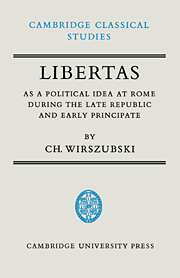Book contents
- Frontmatter
- Contents
- PROLEGOMENA
- CHAPTER 1 GENERAL CHARACTERISTICS OF LIBERTAS
- CHAPTER 2 CIVIL DISCORD: OPTIMATES AND POPULARES
- CHAPTER 3 THE DECLINE OF THE TRADITIONAL FORM OF GOVERNMENT
- CHAPTER 4 THE AUGUSTAN PRINCIPATE IN RELATION TO LIBERTAS
- CHAPTER 5 PRINCIPATUS ET LIBERTAS RES OLIM DISSOCIABILES
- Bibliography of works referred to
- Index
CHAPTER 4 - THE AUGUSTAN PRINCIPATE IN RELATION TO LIBERTAS
Published online by Cambridge University Press: 24 August 2009
- Frontmatter
- Contents
- PROLEGOMENA
- CHAPTER 1 GENERAL CHARACTERISTICS OF LIBERTAS
- CHAPTER 2 CIVIL DISCORD: OPTIMATES AND POPULARES
- CHAPTER 3 THE DECLINE OF THE TRADITIONAL FORM OF GOVERNMENT
- CHAPTER 4 THE AUGUSTAN PRINCIPATE IN RELATION TO LIBERTAS
- CHAPTER 5 PRINCIPATUS ET LIBERTAS RES OLIM DISSOCIABILES
- Bibliography of works referred to
- Index
Summary
PAX ET PRINCEPS
Even Tacitus, who found much to criticize in the Augustan Principate, did not deny it one great achievement, the restoration of peace: “Sexto… consulatu Caesar Augustus, potentiae securus, quae triumviratu iusserat abolevit, deditque iura quis pace et principe uteremur.” And in an earlier work he indicated that the coincidence of peace and the Principate was not accidental, “postquam bellatum apud Actium… omnem potentiam ad unum conferri pacis interfuit”. It is no doubt a fact of great moment for our estimate of the Principate that Augustus himself laid as much stress on the restoration of peace as on the restoration of the Republic. And indeed it seems that the Romans, in so far as they had a free choice at all, willingly accepted the Principate, not because they believed that it was tantamount to the old Republican form of government, but above all because they realized that the new dispensation offered a prospect of lasting peace.
A people exhausted with fratricidal wars needed and desired internal peace, stability, and order more than anything else. The decisive victory of Actium put an end to civil war. But while victories may bring peace, they cannot alone secure it. Sulla was victorious; he claimed to have established peace, yet it did not last long. Caesar also was victorious, and the peace his victories brought was short-lived too. How could the hard-won peace be made to last? This was the heart of the problem that faced the Romans after Actium.
- Type
- Chapter
- Information
- Publisher: Cambridge University PressPrint publication year: 1950



